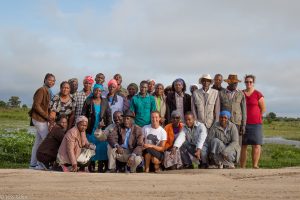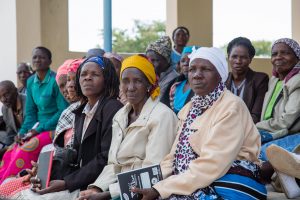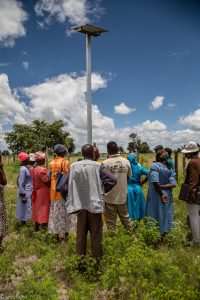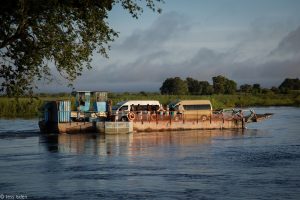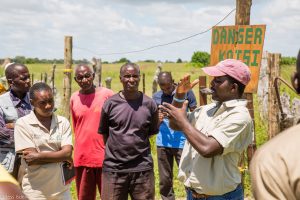Tragic News Update 21 Mar 2017
March 21, 2017
Harmony for Elephants at the Hay Festival – Kate Evans 01 June 2017
June 1, 2017Ferrying Farmers – by Hayley Blackwell 15 May 2017
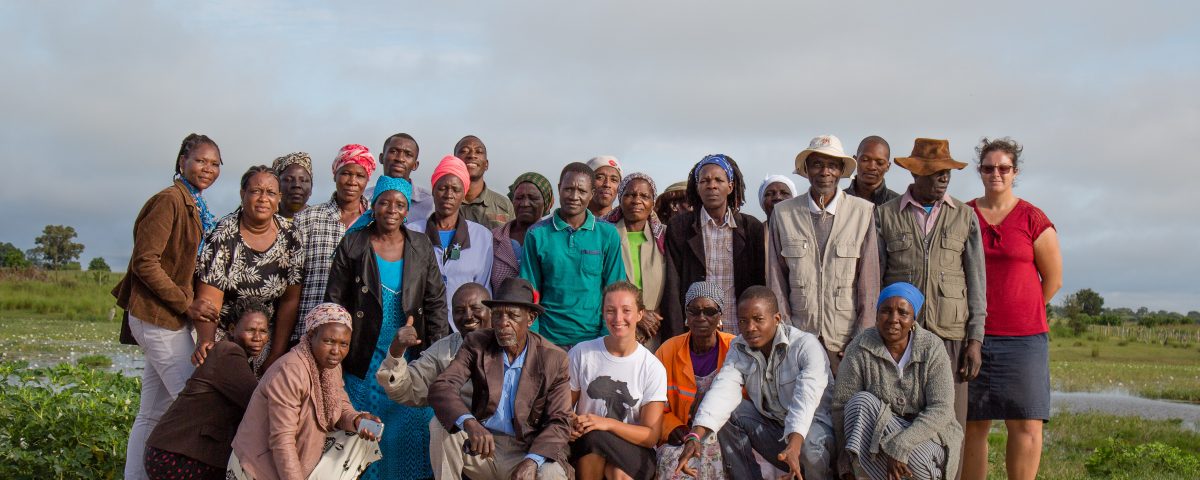
Farmers of Khumaga and EfA staff visiting the farmers of the Pan Handle
One very important aspect of Elephants for Africa (EfA)’s work is our Community Coexistence Project – working with local farmers in the village of Khumaga to reduce human-elephant conflict in the form of crop raiding, and promoting coexistence between people and wildlife. We work hard, alongside the farmers, to trial new and existing mitigation techniqu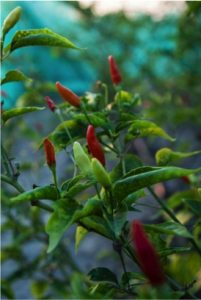 es which will hopefully help keep elephants out of fields and away from crops. If you have been following the work of EfA, you may know that one of the techniques that we have been encouraging for the past couple of years is the use of chilli pepper as an elephant deterrent. The dried chilli irritates the sensitive nostrils of the elephants, discouraging them from entering the field. Chilli pepper can also be produced locally and at low-cost, meaning that it is sustainable for subsistence farmers. We have found that this method helps to reduce crop-raiding incidences, however, it is not 100% effective, and as such we are always on the lookout for new and improved techniques to trial.
es which will hopefully help keep elephants out of fields and away from crops. If you have been following the work of EfA, you may know that one of the techniques that we have been encouraging for the past couple of years is the use of chilli pepper as an elephant deterrent. The dried chilli irritates the sensitive nostrils of the elephants, discouraging them from entering the field. Chilli pepper can also be produced locally and at low-cost, meaning that it is sustainable for subsistence farmers. We have found that this method helps to reduce crop-raiding incidences, however, it is not 100% effective, and as such we are always on the lookout for new and improved techniques to trial.
Ecoexist is another NGO in Botswana who promote human-elephant coexistence in the Okavango Panhandle, an area north-west of the Okavango Delta. They have been working with the farming
communities in this area for more than seven years, and have successfully trialled a number of different mitigation methods. At the end of February 2017, EfA organised an exchange trip, taking some of our Khumaga farmers up to the Panhandle in order to learn about these methods and inspire them to try new ideas. We were also joined by representatives from Dikgosi (the village chiefs), the Village Development Committee and the Ngande Trust; support from these well-respected entities in Khumaga will help farmers spread their experiences to the rest of the community.
Project Manager Dr Jess Isden had her work cut out trying to organise transport, food and accommodation for 30 people, but thankfully it all came together at the last minute. At 6:00 am on 21st February our fleet of two hired combis (minibuses) and two 4x4s gathered in the centre of Khumaga village, and soon we were on our way. The journey took 9 hours along some pretty horrendous roads, but by mid-afternoon, we arrived at Shakawe River Lodge, our home for the next two nights. We had arranged for a mobile safari company to travel to the campsite the previous day, transporting 18 tents and a mountain of bedrolls, and they had set up camp before we arrived. We had taken over almost the entire campsite, which soon resembled a small, canvas village! Unfortunately, heavy rain during the afternoon meant there were a couple of slightly soggy bedrolls, but we soon managed to dry them out. Our tents were situated right on the banks of the Okavango River, in beautiful, forested surroundings, and everyone enjoyed spending the remainder of the afternoon exploring and resting after the somewhat tiring journey.
The next morning we were up early again, ready for an exciting day of demonstrations and discussions. The day began with a short drive upstream to the village of Mohembo, where we boarded a car ferry to take us across the Okavango River to Mohembo East. Once safely on the other side, we were met by some of the Ecoexist Community Officers, who took us to the village kgotla (administrative centre) to be welcomed by the Kgosi (village chief). After all the necessary introductions had been made, the Ecoexist officers and Mankind, EfA’s Community Officer, initiated discussions about the problems that farmers in their respective areas face, and some of the methods that have been used so far to try to mitigate these problems.
Next, we were taken to visit fields belonging to local farmers in order to demonstrate some of the techniques that Ecoexist have employed to try to reduce incidences of crop raiding. One of the techniques that particularly interested us was cluster farming – encouraging farmers to move their fields, which are traditionally extremely spread out, next to each other and erecting a perimeter fence around the entire cluster of fields. The benefit of this is that farmers can work together to defend their fields from elephants and livestock, rather than trying to protect a huge area by themselves as our farmers do currently. Ecoexist has taken this one step further and helped their farmers to build an electric fence around the cluster. The fence is powered by a surprisingly small solar panel and has been extremely successful in stopping elephants from entering the fields. The first few clusters created were made up of around 5-10 farmers each. However, the practice has been so successful and generated much interest that the cluster we went to see, their most recent addition, contained the fields of over 130 farmers! The chairperson of the Cluster Field Committee was also on hand to explain how the farmers cooperate to maintain the electric fence and answer questions about the processes they had to go through in order to set up the cluster, as well as the problems that they have faced.
After a quick lunch break, it was time for us to cross back over the river for a Conservation Agriculture demonstration. However, things didn’t quite go according to plan. A huge line of cars
was waiting to cross, and as the ferry is government owned, all the government vehicles were allowed to jump straight to the front. We spent a frustrating four hours sat in a barely moving queue, which was extremely disappointing given the fact we were only there for one day. The Ecoexist staff told us that usually there are two ferries running in tandem, however one was not working, meaning that the queue was much longer than normal. Eventually, the two combis and the Ecoexist vehicle were able to cross, and they hurried to the Conservation Agriculture demonstration just as the afternoon was drawing to a close. Unfortunately, Jess and I were still stuck on the Mohembo East side of the river with the two 4x4s, and so we missed out on the final activity of the day.
Veni, one of the farmers that Ecoexist works with who has adopted conservation agriculture techniques, gave a very enthusiastic and motivational presentation in his field to demonstrate these methods to the Khumaga farmers. The idea behind Conservation Agriculture is to change the way in which people farm to improve soil quality and thus crop yield, whilst maintaining a healthy ecosystem. Botswana is approximately 85% desert, and it
always amazes me how farmers manage to grow their crops in the sand. Traditionally, due to the poor soil quality, farmers have ploughed vast areas of land with very low productivity. Veni showed our farmers how, by making a few small changes to the way that they plough, weed and maintain their fields they can farm a much smaller and manageable (and easier to defend!) area, whilst still obtaining the same yield of crops. He also explained how some of these methods can also be used to help deter elephants. Win-win!
We are incredibly grateful to Ecoexist for sharing their experience and knowledge with us, and we hope to continue collaborating and sharing ideas with them in the future. The trip appears to have been a success, as it instilled a sense of optimism and enthusiasm in our farmers, and gave them lots of ideas for new mitigation and farming methods to try. However, the true success of this trip will only become apparent over the coming months as we wait to see whether they will put into practice what they have learnt. Trying to persuade people to change the farming methods that they and their families have been using for generations is not an easy task and not something that we take lightly. However, we believe that it is necessary if we are to achieve our goal of human-elephant coexistence, and thereby improve the lives of the people in this community, in the future. If the farmers of Khumaga decide that they are willing to work hard and adopt some of these new, more radical mitigation methods, Elephants for Africa will be there to support and encourage them every step of the way.
Many thanks must also go to the GoodPlanet Foundation for providing funding for this exchange trip, and to all the companies who got involved and helped us on the ground, without whom we could never have carried out such an ambitious trip: Delta Sure Safaris, Letaka Safaris, Pride of Africa and Shakawe River Lodge.

